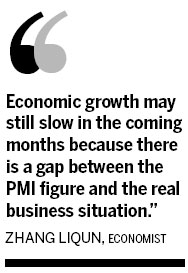 |
|
|
|
|||||||||||
China's manufacturing activities rebounded to a year high in March, signaling a steady economic expansion aided by warming market demand, according to the official Purchasing Managers' Index released on Sunday.
However, the sudden rise in March didn't erase economists' worries about the economy, as they believe there is still space for easing monetary policy to support industrial businesses depending on the situation.
The PMI, a measure of manufacturing expansion, jumped to 53.1 in March, the highest since April 2011, compared with 51 in February and 50.5 in January, according to a statement by the National Bureau of Statistics and China Federation of Logistics and Purchasing.
The figure is based on a survey of managers from more than 800 companies in 28 industries. A reading above 50 means expansion, and a number below 50 shows contraction.

The March PMI indicated that economic growth was rebounding at a faster pace thanks to the increase of new overseas orders amid the easing European debt crisis, according to Zhang Liqun, a senior economist at the Development Research Center of the State Council.
According to the statement, a sub-index of new orders climbed to a 15-month high of 55.1 from February's 51. Meanwhile, the output index reached 55.2 in March, the highest since May 2011, indicating accelerating production in the industrial sector.
New export orders rose to 51.9, up 0.8 points from February, showing steadily increasing overseas demand, according to the statement.
"Exports are growing faster than expected, which is likely to support a GDP rebound in the second quarter after it hit bottom in the first three months," said Cao Yuanzheng, chief economist with Bank of China.
Cao predicted a GDP growth rate in the first quarter of 8.2 percent, the lowest in two years.
"The government may slightly ease monetary policy according to the changing economic climate and boost GDP to 8.4 percent in the second quarter," he said.
In addition, the sub-index of input prices of raw materials increased for the fourth consecutive month to 55.9, "which is a warning for the potential rebound of inflationary pressure", Zhang said.
A statement from the central bank released on Saturday night showed that the government will maintain a prudent monetary policy.
"Although the European debt crisis is easing, there are still uncertainties in the global economy," the statement said.
"But economic growth may still slow in the coming months because there is a gap between the PMI figure and the real business situation," according to Zhang.
HSBC Holdings Plc released its own PMI survey that gave a reading of 48.3 in March, a further drop from February's 49.6, signaling a fifth consecutive monthly deterioration in manufacturing operating conditions.
It was not the first time that HSBC's figures contradicted official figures. Different from the NBS and CFLP survey that covers many big State-owned businesses, most of the HSBC survey's more than 400 respondents are medium and small companies.
"The PMI from the government is more affected by seasonal factors, which have increased by 3.2 points on average in each March from 2005 to 2011 because of the re-started production after the Lunar New Year holidays," said Qu Hongbin, chief economist of Asian economic research at HSBC.
The Hong Kong-based bank said that a continually slowing growth dragged down by weakening new export orders is likely to prompt further easing of monetary policies.
"We still expect at least another cut of the required reserve ratio of 100 basis points in the first half and additional tax breaks and fiscal spending," said Qu in a research note.
The weak economic growth in the world's second largest economy may not improve through the year unless the government unleashes a new stimulus, said Wang Tao, chief economist in China with the UBS.
"The modest policy easing is already under way," said Wang. She expected new bank lending may increase to as much as 900 billion yuan ($143 billion) with one more cut of the reserve ratio in the next two months.
chenjia1@chinadaily.com.cn